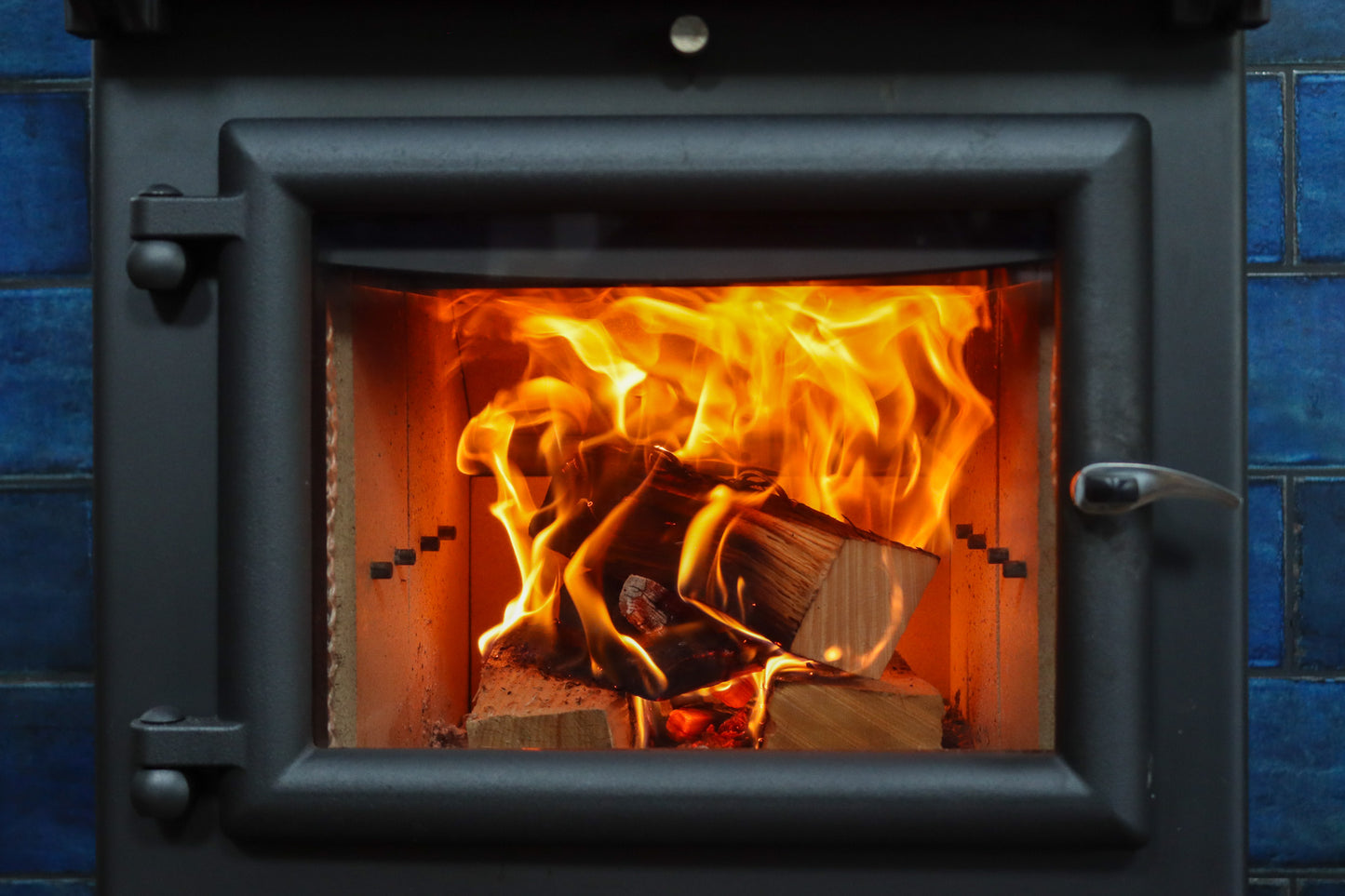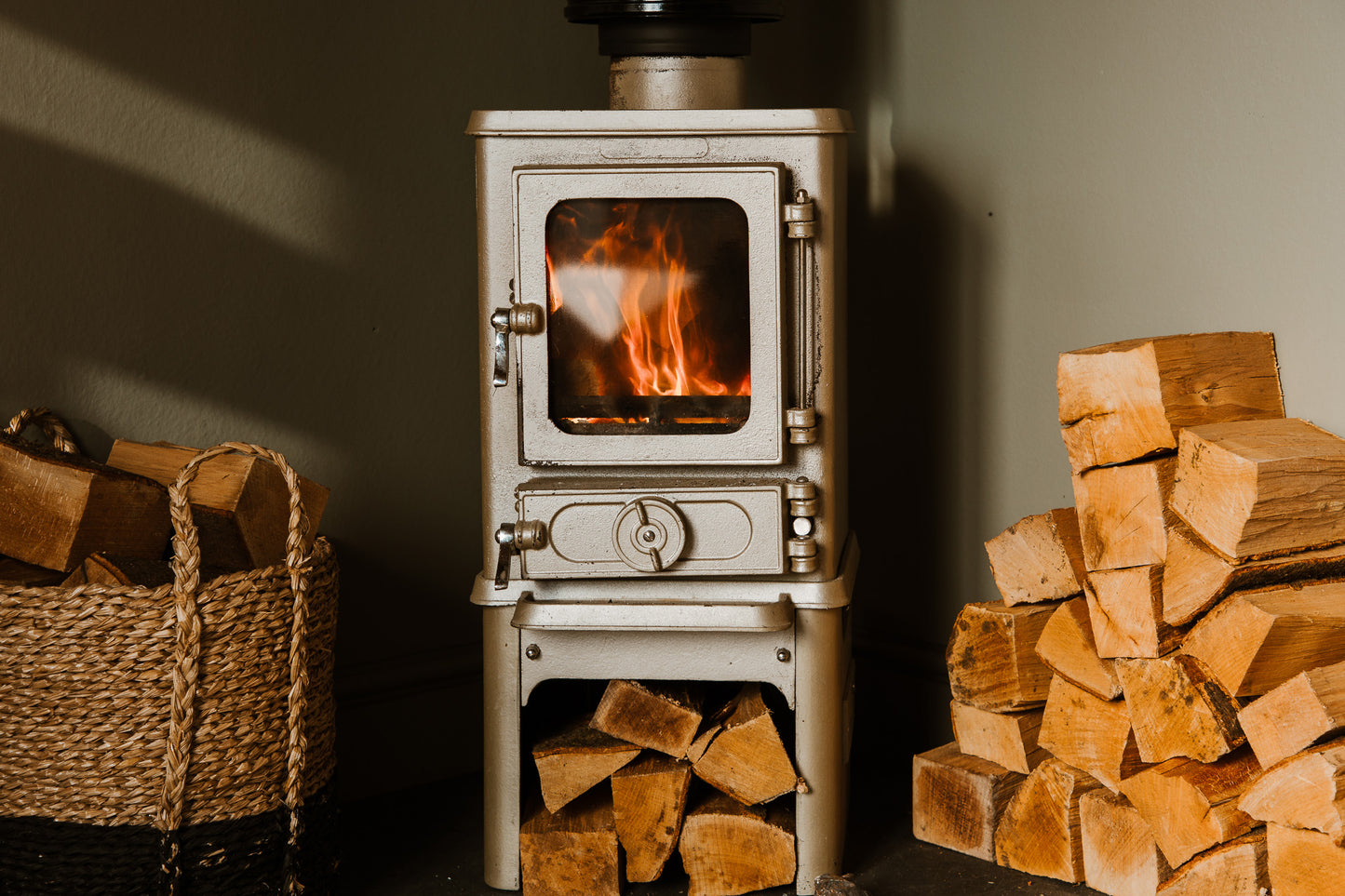

Article first published May 2021, updated November 2025.
Are log burners being banned? It's a question that always appears in the UK headlines around this time of year.
In 2021, DEFRA started implementing changes from their Clean Air Strategy and since then, we've been bombarded with sensational headlines from tabloid newspapers declaring that log burners 'might' be banned and that owners are going to receive huge fines for burning the wrong fuel.
We're taking a step back from dramatic clickbait and giving you the facts and what the changes actually mean to you.
Jump to:
Are log burners being banned in the UK in 2025?
No, log burners are not being banned in the UK in 2025 and there are currently no plans to ban log burners in the UK in the future.
DEFRA's Environmental Plan, published in February 2023 very clearly states:
"We are not considering a ban on domestic burning in England. The UK government recognises that some households are reliant on solid fuel burning as a primary source for heating, hot water and cooking, with this in mind government is not seeking to ban burning. A ban on domestic outdoor burning (bonfires, barbecues, firepits etc.) would also be considered disproportionate"
So if the headlines around a log burner ban have scared you, you can relax. You can keep using your log burner legally as long as you follow the rules around fuel quality and appliance type.
What about Scotland?
In 2024, Scotland briefly introduced restrictions on installing log burners in new-build homes, but these were quickly reversed. There is no log burner ban in Scotland. You can read more about that here.
Who is DEFRA and what is the Clean Air Strategy?
DEFRA (Department for Environment, Food and Rural Affairs) is the UK government department responsible for the environment including air, water, farming and wildlife.
In 2019, DEFRA published its Clean Air Strategy, aiming to reduce air pollution, particularly particulate matter (PM). This was followed by the Environmental Improvement Plan 2023, which clarified that domestic wood burning would not be banned but emissions would be managed more closely.

Why is the DEFRA Clean Air Strategy necessary?
Particulate matter can cause health problems like asthma and heart disease so it’s important to keep levels low. Smoke caused by burning wood contains PM and in general, the more smoke your fire emits, the higher the levels of PM.
The latest UK government figures suggest that 38% of the PM in our atmosphere is from domestic wood burning. This figure is disputed by the industry as it’s based on questionable data, but whatever the real number, if we’re burning firewood, we should be trying to reduce the amount of particulate matter we’re sending into the atmosphere.
By burning properly kiln-dried wood below 20% moisture and using Ecodesign Ready stoves, us log burner owners can significantly cut our emissions and still enjoy our stoves responsibly.
How can I reduce emissions when using my log burner?
Install a DEFRA-approved or Ecodesign Ready stove
Use your air controls correctly - don't close them fully as it will cause your fire to smoulder
Burn only kiln dried hardwood under 20% moisture
Never burn painted, treated or scrap wood
Why shouldn't log burners be banned in the UK?
Whilst the government has no plans to ban log burners in 2025, there are some small groups advocating for the ban.
Here's why we think log burners are great:
- Log burners provide an important source of heat for many UK households.
- Log burners offer independence from energy suppliers, especially while the cost of has central heating is at an all-time high.
- Wood is a renewable heat source, unlike oil or gas and depending on where it is sourced from, can be carbon neutral.
- Having an alternative source of heat gives piece of mind at a time when the UK Energy Research Centre has advised that the UK is 'dangerously unprepared' for another gas crisis and Centrica have reported that UK gas storage is at 'concerningly low levels'.
- Finally, building a fire is fun and log burners create a lovely cosy atmosphere in your home - sitting in front of the fire with a glass of wine is much nicer than sitting next to the radiator!

There are irresponsible log burner owners out there who burn wet wood and coal, causing higher levels of pollution, but we shouldn't tar all log burner owners with the same brush!
It's much better to educate people on the best wood to burn, the proper way to burn it and how to use their log burner properly to reduce emissions, than banning log burners altogether!
What do the DEFRA changes mean for log burner owners?
If you already owned a log burner or open fireplace and bought properly dried wood, not much has changed! Here's what you need to know:
- There are regulations in Smoke Controlled Areas which say that wood can only be burnt in DEFRA Smoke Control Exempt Appliances. These are log burners which have an internal mechanism to prevent the flow of air to the fire being stopped completely, which prevents the fire smouldering and producing too much smoke. If you already have a DEFRA Exempt appliance - good news, you can keep burning kiln dried wood.
- Since 2022, all new stoves sold in England have to meet these same standards, which is great for anyone thinking about buying one. They’re less smoky and your fuel burns more efficiently so you use less of it.
- Don’t worry if you already owned a log burner or open fireplace though, there aren’t any plans to force you to upgrade or change your model.
- If your appliance is not exempt and you live in a Smoke Controlled Area, you'll need to switch to a 'smokeless fuel'.
- There have also been changes to the type of wood that can be sold, in the hope of preventing the most polluting fuels from being burned. Here’s a handy infographic from the DEFRA report.

Since May 2021, wet wood can't be sold in quantities smaller than 2 cubic metres.
Previously, plenty of garden centres sold bags of wet wood which needed to be seasoned for 1-2 years before use. The reality is that most people didn't do that and burned (or attempted to burn) the wet wood. Wet wood doesn’t burn well and emits a lot of smoke and therefore a lot of PM. Customers with lots of space who want to buy more than 2 cubic metres to season at home can still do so.
If you’re already buying kiln dried or properly seasoned wood with less than 20% moisture content, you’re doing a great job – keep it up!
Do I live in a Smoke Control Area?
The best place to check is the DEFRA Interactive Smoke Control Map
What is the best wood to burn in my log burner?
The best wood to burn in your log burner to minimise smoke and maximise heat is hardwood, such as oak or beech, which has been kiln-dried to below 20% moisture.
Need a reliable source of kiln-dried logs for your log burner?
Love Logs are certified Ready to Burn and deliver manageable quantities of British kiln dried logs everywhere in the UK, with free delivery to most postcodes when you spend over £30.
Found this useful?
We'd love it if you shared it with your fellow log burner enthusiasts!









